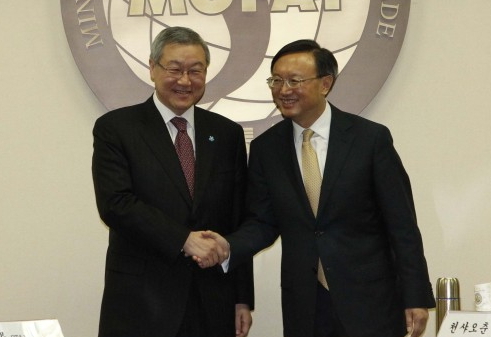Seoul urges China to stop repatriating N.K. defectors
By Korea HeraldPublished : March 2, 2012 - 19:11
President Lee, top officials meet visiting Chinese foreign minister
South Korea on Friday renewed its call for China to stop forcibly repatriating North Korean defectors during a meeting between their foreign ministers in Seoul.
The repeated calls came amid rising public criticism here of Beijing for deporting defectors back to the repressive state against their will despite the possibility of harsh punishment, including torture and execution.
Seoul’s Foreign Minister Kim Sung-hwan and his Chinese counterpart Yang Jiechi held talks over an array of pending bilateral and regional issues including North Korea’s nuclear issues.
Yang was said to have repeated China’s position that it will deal with the issue in accordance with domestic and international laws and humanitarian principles, stressing that it does not want the issue to be “internationalized and politicized.”
The top diplomats’ meeting came two days after Washington and Pyongyang announced an agreement from their high-level talks in Beijing to temporarily halt the communist state’s uranium enrichment program and put a moratorium on its nuclear and long-range missile tests in exchange for “nutritional assistance.”
South Korea on Friday renewed its call for China to stop forcibly repatriating North Korean defectors during a meeting between their foreign ministers in Seoul.
The repeated calls came amid rising public criticism here of Beijing for deporting defectors back to the repressive state against their will despite the possibility of harsh punishment, including torture and execution.
Seoul’s Foreign Minister Kim Sung-hwan and his Chinese counterpart Yang Jiechi held talks over an array of pending bilateral and regional issues including North Korea’s nuclear issues.
Yang was said to have repeated China’s position that it will deal with the issue in accordance with domestic and international laws and humanitarian principles, stressing that it does not want the issue to be “internationalized and politicized.”
The top diplomats’ meeting came two days after Washington and Pyongyang announced an agreement from their high-level talks in Beijing to temporarily halt the communist state’s uranium enrichment program and put a moratorium on its nuclear and long-range missile tests in exchange for “nutritional assistance.”

“I hope that we can enhance bilateral trust through close communication and cooperation, and that the strategic cooperative partnership between the two countries will develop into future-oriented, mature relations,” Kim said prior to the talks.
Yang, in response, said, “I hope that through my visit this time, bilateral strategic communication will strengthen and mutual trust will be established, and that based on this, we can deepen our exchanges and cooperation in a variety of areas.”
Later in the day, Yang paid a visit to President Lee Myung-bak where Lee was also expected to mention the issue of North Korean refugees who risked their lives to escape poverty and suppression in the impoverished state.
The issue of North Korean defectors has emerged as a hot topic in recent weeks here with media reports that scores of them are now at risk of repatriation to the North, whose leadership has reportedly warned of an annihilation of three generations of a family with any member caught defecting.
The Seoul government, which was criticized for being passive and low-key over the issue, has revved up its diplomatic efforts and appealed to the international community by raising it at a U.N. panel on human rights this week.
China has so far refused to regard the defectors as refugees protected by international humanitarian conventions, arguing that they are “economic migrants” who illegally crossed the border.
Experts here point out that China might be concerned about the continuing inflow of North Korean refugees, and that it also cares about its traditional ties with the North.
During the talks, the two ministers welcomed the recent agreement between Washington and Pyongyang, sources said. Observers say the deal has brightened the prospect of resuming the multilateral aid-for-denuclearization talks that have been stalled since the last session in late 2008.
Yang also asked the Seoul government to quickly proceed with discussions over the envisioned Korea-China free trade pact. After domestic procedures over the FTA with China are finalized here, Seoul thinks that the two countries may be able to declare the start of their official negotiations this month or next month.
The possibility of a South Korea-China FTA has been mentioned as the U.S. has been promoting the Trans-Pacific Partnership Agreement in what observers called part of its moves to keep China in check.
Also during the talks, Minister Kim was expected to renew Seoul’s call for forming a two-plus-two council ― consisting of officials from the two countries’ diplomatic and fishery authorities ― to resolve the issue of Chinese fishermen operating illegally in waters controlled by South Korea.
By Song Sang-ho (sshluck@heraldcorp.com)
-
Articles by Korea Herald


















![[Herald Interview] Byun Yo-han's 'unlikable' character is result of calculated acting](http://res.heraldm.com/phpwas/restmb_idxmake.php?idx=652&simg=/content/image/2024/05/16/20240516050855_0.jpg&u=)
